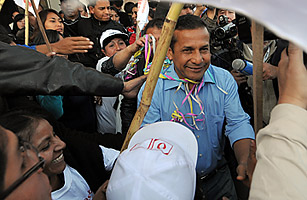
Much attention has been spent on the candidacy of Keiko Fujimori to be president of Peru. After all, she is the daughter of a controversial former president who now sits in prison. However, according to polls, she is running neck-and-neck with Ollanta Humala, a political figure who evokes as much controversy and, at times, hatred as the Fujimori family does.
Humala, 48, is a retired lieutenant colonel in the Peruvian Army. The military was his life for 20 years and up until 2005 he thought his service to the country would only be in the army. “I never really thought about the presidency,” he insists during an interview with TIME two days before the election. “My dream was to be the commanding general of the army.” However, he did enter politics, quitting his job as military attach in Seoul, South Korea. Frightening the more privileged classes with a leftist rhetoric that conjured up images of Venezuela’s Hugo Chvez, he nevertheless came very close to winning his first presidential run in 2006, receiving 47% of the vote. This time around, he got 32% in the first round of presidential voting in April, placing first by a margin of nearly eight points and moving into Sunday’s runoff.
Peruvians opposed to Humala see similarities to Chvez. Humala shot to fame in October 2000 when he led a small band of soldiers in a southern barracks in a revolt against his rival’s father who was then the president and already reeling from a massive corruption scandal that would eventually end his rule. Chvez’s political career began in much the same way in the 1990s. Humala, who was then jailed and dismissed from the army, said that action was simply aimed at getting rid of a corrupt president and nothing more. “The only thing I wanted after the uprising was to rejoin the army and continue with my career. I had no political intentions,” he told TIME.
But there may be another precedent that Humala may repeat. If he does win on June 5, Humala will be in the footsteps of the only other Peruvian military officer who was democratically elected president. Luis Snchez Cerro led a military coup in the 1930s and was a military attach to France. He returned to Peru and was elected president. Humala was reinstated into the army in 2001 after his attempted coup and then named military attach to France before he went on his brief interlude in South Korea. Instead of being a Chvez imitator, Humala could very well be replicating Snchez Cerro.
See TIME’s 140 best Twitter feeds.
See TIME’s Top 10 Everything of 2010.